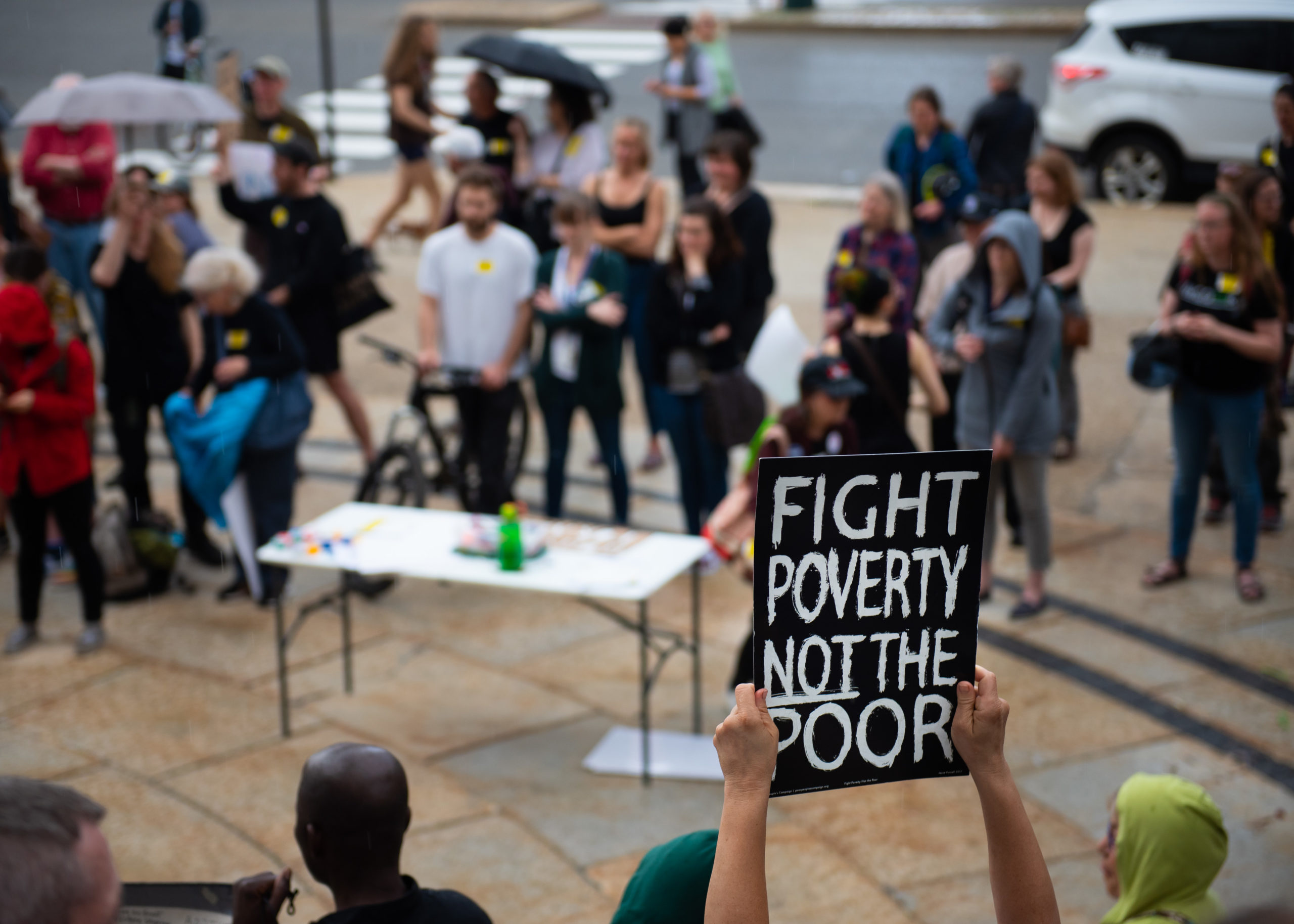Advocacy is a key component of social work. Social workers advocate for clients every day as they help them access healthcare, housing, and social services. While this approach is necessary, valuable, and positively impacts individuals, it does not address the systemic issues that lead to hunger, homelessness, and poverty. To truly address these problems, we must change the broken systems that create them.
From the early days of the High Street Resource Center (which evolved into Preble Street), staff have been helping people meet their needs, empowering them to achieve their goals, and providing them a platform to make their voices heard. This was true in 1975 and it’s still true today. Our work is based on the belief that true change only occurs when people affected by an unjust system are directly involved in addressing those injustices — when marginalized people are heard and gain leadership skills to organize and advocate for institutional and societal change.
Preble Street advocacy efforts work toward solutions to the social, economic, and political systems that have historically perpetuated the inequities of our society. Our advocacy work includes community organizing, policy advocacy, and systems advocacy.
The issues of hunger, homelessness, and poverty persist in our country because of systemic issues including:
- Intergenerational poverty & wealth disparities
- Structural racism & the continued impact of white supremacy
- Concentration of wealth into the hands of a few
- Gentrification and lack of affordable housing
- Social policies that direct wealth upward
- Disinvestment from social services
- “Bootstraps” mentality
- Impact of COVID-19
To quote James Baldwin: “Anyone who has ever struggled with poverty knows how extremely expensive it is to be poor.” When a person’s resources are being stretched just to meet their immediate needs, like keeping a roof over their head or food on the table, there is no opportunity for saving or planning for the future. For people living in these circumstances any unexpected expense could mean total financial ruin.
The social systems that shape our society — like structural racism and the continued impact of white supremacy — have tangible effects on homelessness and poverty. In Maine, Black and African American individuals are ten times more likely to experience homelessness than their White peers; 26% of Maine’s homeless population are Black or African American despite this group making up only 1% of Maine’s general population. This is an issue that needs urgent attention far beyond Black History Month.
Meanwhile, gentrification and a lack of affordable housing are turning Portland and many other Maine towns into places where only the wealthy can afford to live and work, while the health and economic impacts of COVID-19 continue to increase the need for housing and food assistance in our communities. According to a recent National Low Income Housing Coalition study, Maine has the ninth-largest gap between the income of an average renter and the income required to afford a two-bedroom rental. The state constructed just 454 units of affordable housing in 2021, which is less than 2% of the current estimated need of 25,000 units.
Despite this data, there is a prevailing idea that everyone can just “pull themselves up by their bootstraps,” a philosophy that places the blame of homelessness and poverty on the individuals experiencing it rather than the larger systems that perpetrate racial, social, and economic injustices.
Thus, the Preble Street mission: to provide accessible barrier-free services to empower people experiencing problems with homelessness, housing, hunger, and poverty, and to advocate for solutions to these problems. We know that healthy communities depend on dignity, equity, and opportunity for all. Preble Street founder, Joe Kreisler, believed that the community and local government have an obligation to ensure that people have decent housing, access to education, healthcare, and food for their families. Kreisler recognized that many of the institutions that were designed to provide these services actually created institutional barriers to the people most in need of them.
We must follow the lead of our neighbors with lived experience, like our friends at Homeless Voices for Justice, in our advocacy work. In order to end the tragedy of long lines at shelters and soup kitchens, racial injustices, children experiencing hunger, and human trafficking, we must listen to the voices of the people directly impacted by those problems. These individuals are the experts of their own experiences, and we must support their participation in creating and implementing solutions.
Join us in creating change! Be an advocate for your neighbors: Call your City Councilor, testify in front of the State Legislature on a bill, attend a rally or march, write an op-ed for a local newspaper, vote in all elections, and lift up the voices of people with lived experience. To start, visit our Take Action page and/or sign up for Advocacy alerts to stay connected to Preble Street calls to action. Together, we can end homelessness, hunger, poverty, and racial injustice in Maine.

